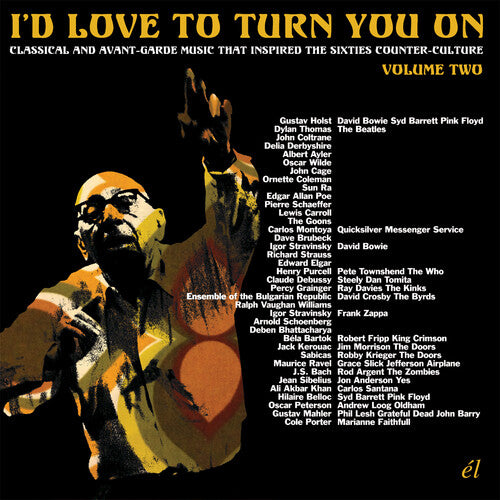El Records
I'D Love to Turn You on Vol 2/ Various - I'd Love To Turn You On Vol 2 / Various
I'D Love to Turn You on Vol 2/ Various - I'd Love To Turn You On Vol 2 / Various
Out of stock
Couldn't load pickup availability
SKU:EL2933593.2
Share
Four CD set. Second volume of I'd Love to Turn You On, a series which explores the relationship between '60s pop and classical music, free jazz and the avant-garde; providing many examples of how popular music evolved, matured and became liberated under the influence of apparently deeper, more expansive genres. While preparing Rubber Soul, Revolver and Sgt Pepper - major artistic achievements that would change popular music forever - The Beatles drew on a wide range of eclectic influences; from the outer limits of jazz (John Coltrane, Ornette Coleman, Sun Ra, Albert Ayler) and from the audacious sound experiments of modernist composers including John Cage, who believed all sound to be music and Pierre Schaeffer who pioneered musique concrète. Looking to strike a balance, George Martin contributed a more formal classical understanding which proved essential in creating such productions as 'Yesterday' and 'Eleanor Rigby'. Literary enthusiasms also played a part - with Lewis Carroll a less than distant echo on 'Lucy In The Sky With Diamonds' and 'I Am The Walrus' - as did a certain playful irreverence derived from the anarchic humour of The Goons. With psychedelia in it's infancy and with everything possible, many other popular artists, brought up on blues or beat felt encouraged to embrace music from further afield. In 1965, live performances of David Bowie's group, The Lower Third, came to a screaming conclusion with a feedback-laden interpretation of 'Mars' from 'The Planets'. The fantasy quality of Syd Barrett's songwriting for Pink Floyd's debut 'Piper At The Gates Of Dawn', drew on the nonsense verse of Hilaire Belloc. Pete Townshend was introduced to the music of the 17th century English composer Henry Purcell by his manager Kit Lambert. The 'Gordian Knot Untied' uses a series of suspended chords. The sadness and sophistication of the chord suspensions made a strong impression on Townshend and he began incorporating the idea into his work, with the intro to 'Pinball Wizard' being the classic example. In America, Frank Zappa and the Mothers Of Invention's revolutionary debut, 'Freak Out!', connected modernist composition to pop citing Stravinsky, Schoenberg, Boulez and Varèse under the heading "These People Have Contributed Materially in Many Ways to Make Our Music What it is". The album was both without precedent and of great influence. Not for nothing did Paul McCartney reportedly call 'Sgt Pepper' "our 'Freak Out!'. "



